UA.LABDESIGN 2025 Roundup
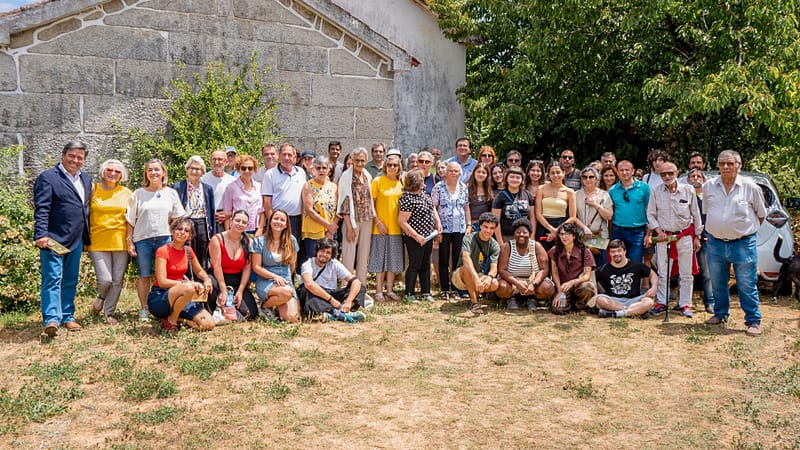
News & events UA.LABDESIGN closes 3rd edition with exhibition at AmaCastelões Association UA.LABDESIGN – University in the Villages is a collaborative design research and creation project that began in 2023. During an immersive week in the territory, students, master artisans, researchers, and local inhabitants work together in workshops that cross tradition with innovation, and local knowledge with contemporary practices. This project is the result of the doctoral research “New with Tradition: Dialogues between Design, Wisdom, and Innovation” by Cristiane Schifelbein de Menezes, whose thesis was defended in February 2025. The UA.LABDESIGN 3.0 group at the AmaCastelões association Headquarters The 2025 edition, under the theme Epiphanies, continued the journey started with By the Soul of Linen (2023) and The Spirit of Sharing (2024). The workshops explored revelations that emerge from an attentive dialogue with places, materials, and people, promoting intergenerational encounters and new forms of collaborative creation. In 2026, UA.LABDESIGN will be supported by the CULTURALITY project, which will contribute to its strengthening and internationalization in the context of a #RuralEvent, expanding the reach and impact of this initiative. The results of this encounter are at the headquarters of AmaCastelões. The exhibition is open to the entire community. https://www.cm-tondela.pt/1895/municipio-apoiou-novamente-realizacao-do-ualabdesign Share with:
53rd Beltinci International Folklore Festival

News & events 53rd Beltinci International Folklore Festival Celebration of intangible cultural heritage From 18 to 21 July 2025, the village of Beltinci hosted the 53rd International Folklore Festival, one of Slovenia’s most prominent events in the field of intangible cultural heritage. With its rich and diverse programme, the festival once again demonstrated the powerful role of folklore creativity in promoting cultural diversity, supporting regional tourism development, and strengthening local identity. This year’s edition placed special emphasis on the topic of creativity and heritage among Slovenians living abroad and in neighbouring countries. For decades, the Beltinci festival has successfully used folk dance, music, and other forms of intangible cultural heritage to shape a recognizable tourist offering in remote rural area. This year’s programme featured a wide range of events, from a traditional handicrafts fair and exhibition to performances by domestic and international folklore ensembles. These performances attracted numerous visitors from Slovenia and abroad and demonstrated how heritage-based events can contribute to the sustainable development of marginal regions. Among the contributors to this year’s festival was Saša Poljak Istenič from CULTURALITY partner ZRC SAZU, who participated in the opening round table titled “Creativity and Heritage among Slovenians Abroad and in Neighbouring Countries” and served as the honourable speaker at the closing ceremony. In her address, she emphasized that intangible cultural heritage unites nations and that creativity—such as that expressed through craftsmanship—ensures the sustainability of heritage and enhances its relevance in the modern world. The invitation of a CULTURALITY project member to the festival highlights the organizer KUD Beltinci‘s awareness of the value of involving experts in heritage-based events Each year, the Beltinci festival continues to prove that heritage is a creative process that brings people together, strengthens communities, and offers innovative opportunities for local development. Photography: Saša Poljak Istenič and Boštjan Rous https://sloveniatimes.com/event/522/beltinci-international-folklore-festival Share with:
LaPonte represents CULTURALITY at SoCanTur

News & events Ecomuseum La Ponte represents CULTURALITY at the 5th International Congress of Sociology and Anthropology of Tourism On the 11th, 12th and 13th of June, Carmen Pérez Maestro, representing the Ecomuseum La Ponte and the CULTURALITY project, attended the 5th International Congress of Sociology and Anthropology of Tourism, held in the city of A Coruña, Galicia, Spain. This congress is a benchmark for interdisciplinary reflection on the sociocultural, political and economic dimensions and impacts of tourism. A paper was presented entitled “Research tools for tourism and heritage governance in rural areas: the role of the La Ponte Research Centre and Ecomuseum, Asturias, in the Culturality project.” It was part of the working session “Tourism, Governance and Local Development”, a discussion forum exploring the relationship between tourism governance and tourism management in support of sustainable and local development. https://socantur.com/images/2025LCG/programa/SocAnTur2025_ProgramaComunicaciones.pdf Share with: Previous Post
AlpTextyles project at Milano Unica fair

News & events AlpTextyles project at Milano Unica fair In July 2025, Katarina Šrimpf Vendramin from ZRC SAZU attended the international fair show of high-quality fabrics and fashion accessories Milano Unica in Italy. The AlpTextyles project, which was recognized as a good practice by the partners of the CULTURALITY project and included in the catalog (D3.1 Inventory of good practices), presented at its stand how Alpine textile traditions can be reimagined for a circular, regenerative future. Visitors were invited to explore material roots of Alpine textile handicrafts, regional short supply chains, and upcoming open-access online course designed to share sustainable, circular, and heritage-based practices with students, professionals, and communities. Katarina also moderated a roundtable discussion on safeguarding textile traditions. CULTURALITY and AlpTextyles share the common goals of revitalizing local communities through traditional crafts, innovation and digital tools. Milano Unica offered a rich ground for establishing new partnerships and exploring innovative market opportunities that can also empower CULTYRALITY’s mission of weaving cultural heritage into sustainable, creative, and locally rooted economic practices. Such fairs are also an opportunity to present heritage materials and stories to a global audience, which is crucial for visibility of local sustainable crafts and cultural tourism development. Milano Unica was also attended by the Handicrafts Centre Škofja Loka, which will use the inspiration gathered at the fair for co-organizing the CULTURALITY #RuralEvent with ZRC SAZU, in September 2025. Photography: Federico Masini for AlpTextyles https://www.alpine-space.eu/event/alptextyles-final-event-at-milano-unica-2025/ Share with:
Region Värmland #RuralSpot Round-up
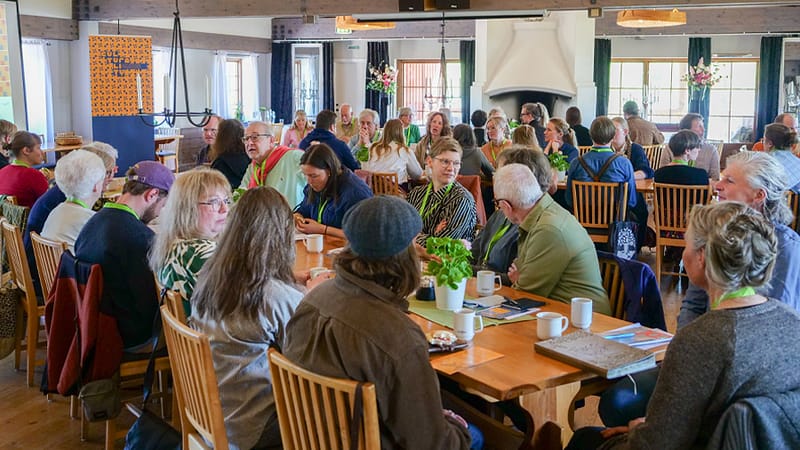
News & events Things Are Bubbling in Värmland! On May 15, 56 artisans and cultural practitioners, association members, and professionals from the tourism sector and Arvika Municipality gathered at Brunskog’s heritage center in Värmland to exchange ideas for activities, experiences, and methods that could bring new life to western Värmland and its surroundings. “Things Are Bubbling” was part of Region Värmland’s #RuralSpot event for CULTURALITY. Brunskog’s Heritage Center Brunskog’s heritage center is a place with great potential. It has a long history of cultural heritage work, but it also needs to develop new activities for visitors, especially during the off-season. The surrounding area is home to many craftspeople, artisans, and other cultural actors who will be a driving force in the continued development process. Inspirational Lecture by Mikael Öst The day began with an inspirational lecture by Mikael Öst from Delsbo in the Hälsingland region of Sweden. In Mikael’s artistic practice, storytelling is central. By developing and placing tradition in a new context, he creates new frameworks that bring cultural heritage to life. Participants’ Ideas in Focus The main focus of the day was to highlight the participants’ own ideas and questions. Even before the gathering, they were asked to reflect on the needs and desired development of the area, the tourism sector, and their own work. The event was organized as an Open Space meeting, where the process was driven by the participants’ own questions—giving them the opportunity to shape the content themselves. During three sessions, they were free to choose discussion groups based entirely on their own interests. Some of the questions discussed included: What symbols exist and are being created around the cultural heritage of Värmland? How can we engage young people in preserving their local cultural heritage? How can we promote tourism destinations through educational courses? How can different cultural expressions create unexpected synergies with other practices, such as e.g. sports and heritage? There was strong engagement among the participants across various cultural fields. A clear will and knowledge to develop the countryside was evident, and through Culturality, there is an opportunity to connect different forces. The gathering also provided an important space for participants to form new contacts and expand their networks. Share with: Previous Post
Espacio Tormaleo #RuralSpot in Asturias
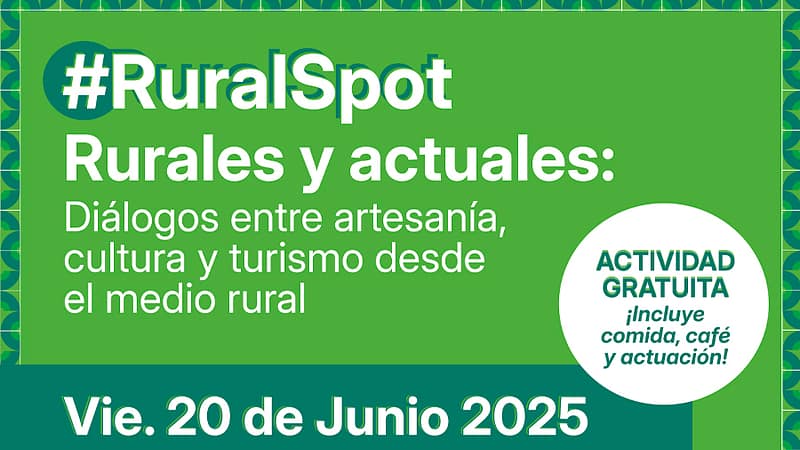
News & events CULTURALITY Partner Espacio Tormaleo Hosts #RuralSpot Event in Asturias On 20th June 2025, Espacio Tormaleo is hosting a full-day event in Zarréu (Degaña, Asturias) as part of CULTURALITY. This event is part of the series called Rural Spot, which is organised by project partners in remote rural areas to foster knowledge exchange and community engagement through cultural heritage. This edition, entitled “Rurales y Actuales”, brings together local stakeholders, cultural professionals, and policy experts to explore key themes such as gender and culture, craftsmanship and innovation, and the links between cultural management and tourism. The programme includes expert presentations (some online), local discussion panels, and networking opportunities. The event is supported by the Degaña Town Council and other local and regional institutions. The day will close with a folktrónica/electrofolk DJ set by Castora Herz (Samain Music). All activities are free and open to the public, with refreshments and lunch included. Check out the full programme below (in Spanish): Share with: Previous Post
Ljubljana Symposium Explores Contemporary Handicrafts and Culturality Themes
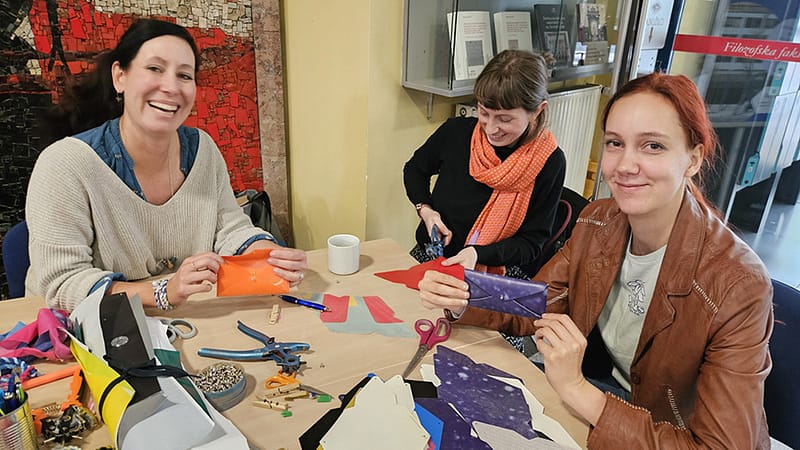
News & events Ljubljana Symposium Explores Contemporary Handicrafts and Culturality Themes The international symposium “Hands-on Ethnographies: Production and Meaning of (Contemporary) Handicrafts”recently took place in Ljubljana, bringing together researchers, practitioners, and artists to explore critical perspectives on craft. The event addressed key issues such as gender roles in handicraft practices and marketing, the evolving relationship between contemporary artists and traditional craftspeople, and broader questions that resonate with the CULTURALITY project’s core themes. Saša Poljak Istenič from ZRC SAZU, one of CULTURALITY’s partners, moderated a session dedicated to representations of craft in cultural discourse, while a second session focused on the practical aspects of handicraft production. The symposium also featured a vibrant handicrafts fair with hands-on workshops in sewing, macramé, and even household appliance repair—highlighting the ongoing relevance and adaptability of traditional skills in modern contexts. conference 2 conference 1 fair 3 fair 1 fair 2 fair 4 Share with:
UNIOVI at Asturias Science and Innovation Fair

News & events CULTURALITY’s partner UNIOVI connects science and heritage at the 3rd Asturias Science and Innovation Fair On May 9, several members of the University of Oviedo team participated in the 3rd Asturias Science and Innovation Fair with their newly released activity “Discover the craft/Descubre el oficio”, an interactive proposal designed to bring the world of traditional crafts closer to younger audiences through multisensory interaction. Santiago Rodriguez Fernández & Ángela Sánchez Herrero taking over the stand for the second shift Through their senses of touch, smell and hearing, visitors and participants of all ages had to guess which typical artisanal craft different raw materials related to and then locate their region of origin on a decent-sized map of Asturias. The activity took place in the morning for high school, vocational and training students, and was open to the general public in the afternoon. Lucía Pérez Fernández, Marta Fernández Vilar & Llara Fuente Corripio explaining the activity Llara Fuente Corripio explaining the game to some participants Flyers, stickers & various materials used during the activity This initiative was conceived within the framework of the Es|Art research group at the University of Oviedo and implemented by a multidisciplinary team of members of CULTURALITY (Llara Fuente Corripio, Marta Fernández Vilar, Ángela Sánchez Herrera, Lucía Pérez Fernández, and Santiago Rodríguez Pérez). This action is part of its broad outreach program, aimed at highlighting the value of cultural heritage and traditional practices and promoting awareness of craft practices in rural Europe. Text: Lucía Pérez FernándezPhotography: Lucía Pérez Fernández, Ana María Fernández García, Santiago Rodríguez Pérez III Feria de la Ciencia y la Innovación de Asturias (Official Website) Share with: Previous PostNext Post
A new project on the Asturian Fiddle

News & events A new project on the Asturian fiddle Celia Nieto and Marta Fernández Vilar coordinate the recordings of a book-disc linked to the “Xornaes del Vigulín” Yesterday morning, the recordings of what will be a book-CD linked to the “Xornaes del Vigulín” (L’Infiestu) started at Supersonic Studio. This initiative, held by CULTURALITY, coordinated by the University of Oviedo, has seen “Xornaes del Vigulín” as an example of good practices of Cultural Heritage curatorship in the rural world. Vigulín player recording in the studio Recording session in the studio Celia Nieto and Marta Fernández Vilar are coordinating the musical part of this book-CD, with the participation of various fiddlers of the Asturian folk scene, students and teachers of the “Xornaes”. The book will also include a compendium of articles studying different aspects of the violin within the Asturian musical tradition, as well as the scores of the different recordings. The book is expected to be published in September and will be available open access. Xornaes del Vigulín on Facebook Text and Images: Marta Fernández Vilar, UniOvi Share with:
Upcoming International Symposium to Explore Contemporary Handicrafts
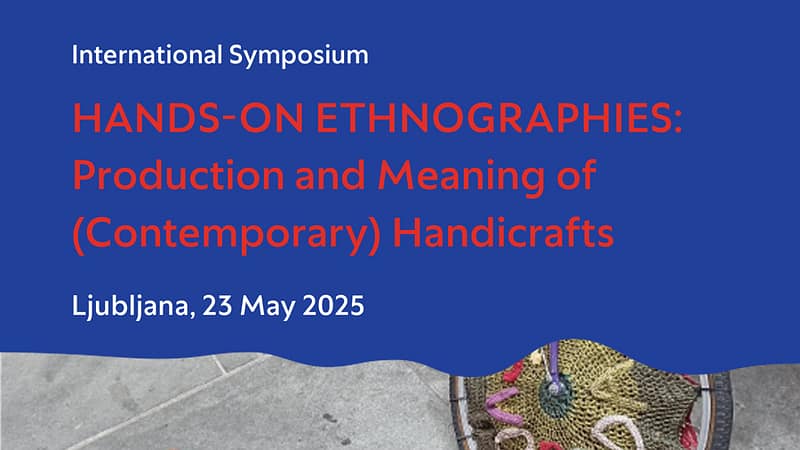
News & events Upcoming International Symposium to Explore Contemporary Handicrafts On May 23, 2025, Department of Ethnology and Cultural Anthropology at the Faculty of Arts, University of Ljubljana will host the international symposium “Hands-on Ethnographies: Production and Meaning of (Contemporary) Handicrafts”. This event, part of the Faculty of Arts’ Year of Heritage, will bring together researchers and enthusiasts to explore the dynamic field of handicrafts. The symposium will feature sessions examining the representation and practices of handicrafts in today’s world. Discussions will cover various topics, including the social role of handicrafts, women’s perspectives on craft production, the impact of technology on traditional practices, and the potential of handicrafts to address challenges of adolescence and ageing. Saša Poljak Istenič from the Culturality project team will moderate the “Representations” session, bringing findings from recent Culturality research into the conversation. In addition to the academic discussions, the event will highlight the practical and social dimensions of handicrafts. A handicraft fair scheduled for the same day will enable visitors to interact with craftspeople and their creations directly. Furthermore, a public discussion on May 22 will explore the cognitive benefits and contemporary significance of engaging in handicraft activities. The symposium aims to emphasize the ongoing importance of handicrafts in contemporary society, highlighting their connections to cultural heritage, economic structures, and personal well-being. Download the Book of Abstracts Share with: Previous Post

